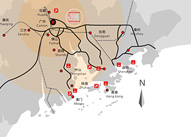

- Home
- CEST
- Business Area
- News
- Event and Activities
By signing up, you agree to the CEST's Terms of Use and Privacy PolicySign upExecutive Training
Centre of Excellence for Software Transfer is an outstanding base which constructed by Sino-Singapore international knowledge transfer hub and the important platform of Knowledge City.
CEST an outstanding transnational and cross-cultural strategic communication platform and a highly recognized hub with intellectual resources of both countries. CEST shoulders the mission of carrying forward the fine cultures and knowledge between China and Singapore.

New Pattern, New Ideas -- Experts’ Views on the “Dual Circulation”
2020.11.17

“Establishing a new development pattern where domestic and foreign markets can boost each other with the domestic market as the mainstay is a strategic choice to raise the level of China’s economic development, as well as to forge new advantages in global economic cooperation and competition.” --Xi Jinping
On November 17th, hosted by the Organization Department of the Huangpu District Party Committee and the Organization Department of the Party Working Committee of Guangzhou Development District (ODPWC-GDD), Sino-Singapore Guangzhou Knowledge City Investment & Development Co., Ltd(GKC Co), and organized by Centre of Excellence for Software Transfer (CEST), a lecture of the 2020 “Inbound Training Series” on the theme of “New Ideas for Regional Economic Development under the New Pattern of Dual Circulation” was successfully held at the Guangzhou Science City Conference Center.

Accelerating the establishment of a new development pattern featuring dual circulation, which takes the domestic market as the mainstay while letting domestic and foreign markets boost each other, is a strategic decision made in accordance with changes in China’s development stage, environment and conditions, and a systematic deep-level reform concerning the overall situation of the country. It has attracted great attention both at home and abroad.
In order to give the public an insight into the dual circulation development strategy, CEST invited Professor Liu Hong, Tan Lark Sye Chair Professor of Public Policy and Global Affairs Chair, School of Social Sciences Director, Nanyang Centre for Public Administration Nanyang Technological University, Singapore and Professor Zhao Jianzhi, Associate Professor of Economic and Public Policy and deputy director for the Center for Global Governance at the School of International Relations and Public Affairs of Fudan University to discuss and analyze this important strategic deployment.
Xiao Cong, Director of the Veteran Cadre Bureau of the Huangpu District Committee and the Party Working Committee of Veteran Cadre Bureau in the Guangzhou Development District, Deputy Director of the Organization Department of the Huangpu District Committee and the Party Working Committee of the Guangzhou Development District, attended the speech and presided over the lecture.
Yu Lintao, Deputy Director of the Organization Department of the Conghua District Committee, Guangzhou City, and Secretary of the Party Working Committee of Non-public Economic and Social Organizations, also attended the lecture.
The lecture attracted about 200 participants, including officials from various departments of Huangpu District, managers from various state-owned enterprises, representatives and personnel from various economic enterprises.
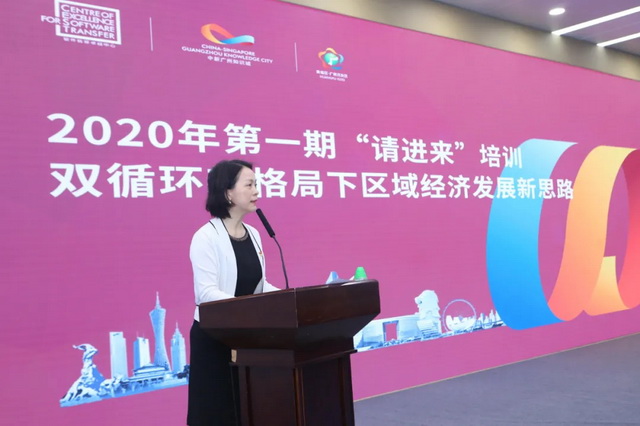
Xiao Cong, Director of the Veteran Cadre Bureau of the Huangpu District Committee and the Party Working Committee of Veteran Cadre Bureau in the Guangzhou Development District, Deputy Director of the Organization Department of the Huangpu District Committee and the Party Working Committee of the Guangzhou Development District, attended the speech and presided over the lecture.
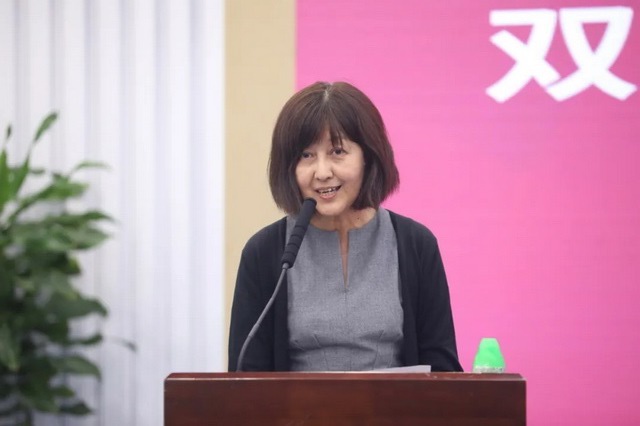
ONG Bee Hong, DCEO of Sino-Singapore Guangzhou Knowledge City Investment & Development Co., Ltd, attended the lecture and delivered a speech.
Professor Liu Hong shared online
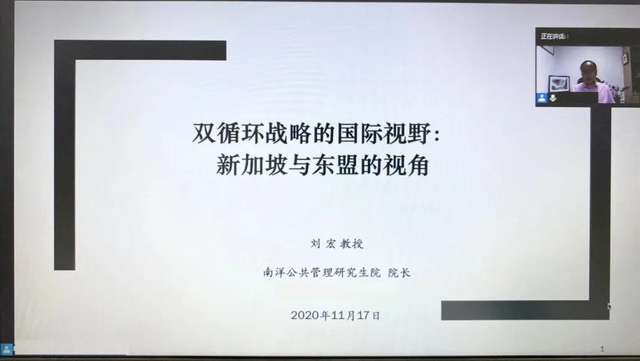
In the lecture, Professor Liu Hong mainly focused on the following four points from a Singapore and ASEAN perspective:
1. The Necessity and Possibility of a Dual Circulation Strategy
2. How can the International Circulation Unfold in the New Situation
3. Singapore Perspective and Experience
4. ASEAN and the Maritime Silk Road
Professor Liu Hong gave an in-depth analysis of the challenges facing the world economy, the new situation of world economic development, the bilateral trade development between China and Singapore, and the international circulation of global talents. The lecture received great responses from the audience. In the end, Professor Liu Hong concluded that the COVID-19 pandemic has a great impact on the international political and economic situation and the development of China; the Sino-US relationship is complex and changing, and may face more challenges and constraints in the future; the global industrial chain may face new challenges.
Professor Liu Hong also provided six suggestions on how to start the international circulation under the new situation:
1. Seek a niche in the global value chain
2. Align with existing national and global strategies (Guangdong-Hong Kong-Macau Greater Bay Area, Belt and Road Initiative)
3. Strengthen cooperation mechanisms (national, local, industrial levels)
4. Study local needs and promote mutually beneficial cooperation
5. Foster an enabling business environment
6. Attach greater importance to the talent strategy
Professor Zhao Jianzhi
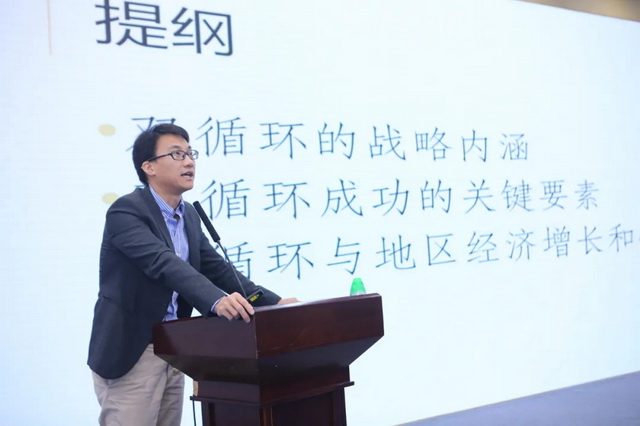
Professor Zhao Jianzhi analyzed the current situation of world economic development in three aspects:
1. The impact of COVID-19 epidemic on the global economy (GDP per capita)
2. Changes in global trade and global chain
3. Trade logic
Combing some cross-year economic data and other data such as the China-US trade surplus data, Professor Zhao Jianzhi shared his detailed insights on the strategic connotations of the “dual circulation”, factors contribute to the success of “dual circulation”, and the relevant regional economic growth and public policy making.
Keywords: Openness, Domestic demand
1. Build a new pattern of all-round and high-level open development
2. Boost the allocation efficiency of resources and the economic growth should be more sustainable
3. Attach greater importance to the restructuring of urban and regional development as it is essential for promoting a balance between domestic and foreign demand
4. Deepen regional cooperation mechanisms
In addition, Prof. Zhao shared the importance of “increasing the flexibility of land and housing management”, “strengthening the role of the metropolitan area as a growth pole”, “deepening the reform of the household registration system” and “optimizing the quality of public services and urban management.
Finally, Prof. Zhao mentioned six pitfalls that China needs to bypass in the next 10 years.
1. Middle-income group growth and efficiency
2. Distribution of social resources
3. Technological development and innovation
4. Aging society, fewer children, lower savings
5. International and regional economic debt leverage, and ineffective monetary stimulus
6. Competition in international markets
020 3211 2888
Block A2, No.5, China-Singapore Smart 1st Street, China-Singapore Guangzhou Knowledge City, Huangpu District, Guangzhou, Guangdong Province
CloseCopyright Statement
© Centre of Excellence for Software Transfer (CEST), 2018
This website and its contents are protected by copyright and other intellectual property rights. The copyright of the contents and materials, except for any third party information available on this website, is owned by CEST. You may not reproduce, disseminate, adapt, modify or incorporate in printed or electronic form, any parts of the contents or materials available on this website without the prior written permission of CEST.
The name, logo and crest of CEST are the trademarks of the CEST. You may not use, reproduce, copy or redistribute these trademarks without the prior written permission of CEST.Disclaimer Statement
CEST has the right to change the contents of this website from time to time without prior notice. All images (including but not limited to illustrations, perspectives, design drawings, etc.), models, text descriptions, etc. in this website are for reference only and are not any commitment or offer of CEST.
CEST gives no warranty and accepts no responsibility or liability for the accuracy or the completeness of the information and materials contained in this website. Under no circumstances will CEST be held responsible or liable in any way for any claims, damages, losses, expenses, costs or liabilities whatsoever (including, without limitation, any direct or indirect damages for loss of profits, business interruption or loss of information) resulting or arising directly or indirectly from your use of or inability to use this website or any websites linked to it, or from your reliance on the information and material on this website, even if CEST has been advised of the possibility of such damages in advance.
This website also contains links to other internet sites. Such links are provided as an information service for the users of this website. As CEST has no control over third party sites, the user hereby acknowledges and agrees that CEST is not held responsible or liable for any content or material on such sites. In providing such links, CEST does not in any way, expressly or implicitly, endorse the linked sites or resources or the respective contents thereof. The user further acknowledges and agrees that CEST shall not be responsible or liable, whether directly or indirectly, for any damages or loss caused or sustained by the user, in connection with any use or reliance on information or material obtained from third party sites.
If the content of the works, copyright and other issues need to be linked with CEST, please contact us within 30 days after the relevant works published.
Centre of Excellence for Software Transfer
Address:Block A2, No.5, China-Singapore Smart 1st Street, China-Singapore Guangzhou Knowledge City, Huangpu District, Guangzhou, Guangdong Province
Contact:86 20 3211 2888
Fax:86 20 3211 2999
Email: cest@ssgkc.com
- Business Area




